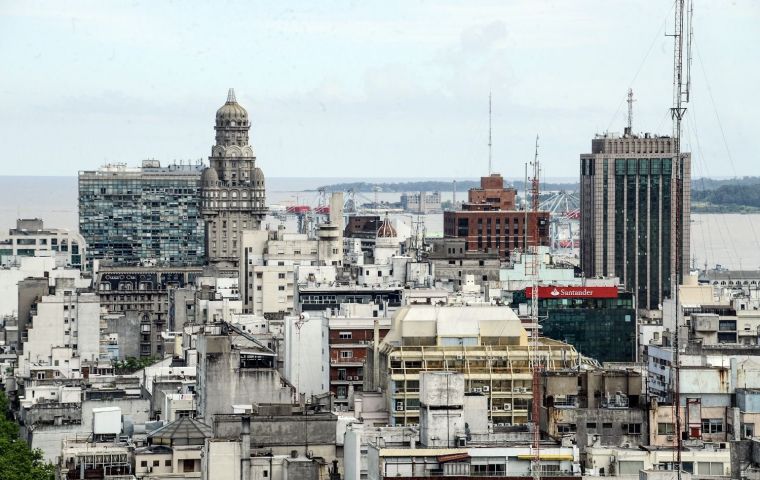MercoPress. South Atlantic News Agency
Uruguay ranked among best places for investing in the near future
 Uruguay “has strong political parties and a stable and predictable macroeconomic framework”
Uruguay “has strong political parties and a stable and predictable macroeconomic framework” According to one of the world's leading financial magazines, Uruguay remains “a haven of stability in a volatile region.” The report featured the opinions of experts participating in a regular survey, who were asked to evaluate 174 countries quarterly.
The British magazine Euromoney delivered a report “providing a useful measure of relative risk for investors around the world,” according to which “Uruguay is the 18th safest country on the planet” and “the safest country” in Latin America to invest in.
Uruguay's risk score continued to improve during the first half of 2022 thanks to measurements taken from evolving political and economic indexes in addition to other metrics including “access to capital, a structural assessment, and debt ratings,” it added.
President Luis Lacalle Pou, who succeeded Tabaré Vázquez in 2020, is halfway through his five-year term as the head of a broad coalition led by his National Party, with plenty of time to continue “with his reformist agenda,” the magazine explained.
Lacalle's authority was boosted by a referendum held in March to consider whether 135 articles of the Law of Urgent Consideration (LUC), the administration's main initiative, should be repealed, as the leftist opposition Frente Amplio together with labor unions sought.
According to Euromoney “the repeal was rejected by voters, so measures including curbing the government's ability to run fiscal deficits and limiting the right to strike are retained. Voter support maintains a business-friendly and investor-friendly agenda, ”which otherwise would not have been the case.“
”The president is also popular for the way his administration handled the pandemic and protected the economy,“ the report added.
With economic winds having shifted, inflation has risen together with interest rates. The labor market needs revitalizing to reduce unemployment, tourism is slowly recovering, and new waves of covid-19 will test the economy and the healthcare system, Euromoney insisted.
”Lacalle Pou has shown a desire to tackle inflation“ and to seek ”trade agreements. He also wants to reform the social security system to ensure its long-term financial sustainability,“ the report went on while adding that tensions with Mercosur were significant as Brazil is going to the polls in a fortnight and Argentina next year.
”Uruguay has relatively high pension spending compared to other countries (around 10% of GDP). Half of this spending is financed by taxes and is expected to continue to increase in the coming years. Therefore, different players agree that reform is needed,“ local pollster Maria Ines Mailhos told Euromoney.
”The president himself presented it to the opposition party and discussed it beforehand. The only visible opposition are the unionized workers, but they do not have the strength to paralyze it. The reform seeks to improve the pension system in the medium term in terms of sustainability. That is why it will be good for public finances,“ consultant Gaby Nudel told Euromoney.
”Uruguay is certainly very attractive,“ while ”the survey scores for Brazil, Chile, Colombia, Mexico, and Peru have deteriorated this year, highlighting increased investor risk, along with the region's riskiest options, Argentina and Venezuela, which rank 162nd and 167th, respectively, in Euromoney's global risk rankings,“ the magazine explained.
Uruguay ”has strong political parties and a stable and predictable macroeconomic framework. It is a well-functioning democracy with solid institutions. In the region, it stands out for its social and political stability,“ Mailhos argued.
Nudel concurred: ”It is a combination of characteristics: political stability with good dialogue between parties, financial and fiscal solvency, social cohesion and democratic spirit, more attractive to foreign investors because of tax incentives.“
According to Euromoney ”there are always issues to address. Inflation and lower growth have been mentioned. This will put some pressure on fiscal targets for 2023 and 2024. Nudel also points to a somewhat new and increasingly important factor to monitor: urban insecurity.“
”However, Uruguay appears to be better positioned than most to meet these challenges. After all, it is the least risky Latin American country to invest in and does not appear to be about to lose that status any time soon,” the magazine concluded. (Source: El País)




Top Comments
Disclaimer & comment rulesCommenting for this story is now closed.
If you have a Facebook account, become a fan and comment on our Facebook Page!